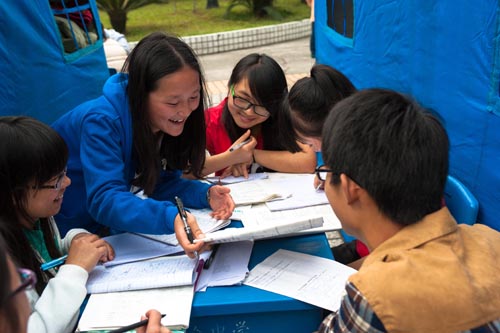第三部分 阅读理解(共20小题;每小题2份,满分40分)
阅读下列短文,从每题所给的四个选项(A、B、C和D)中,选出最佳选项,并在答题卡上将该项涂黑。
A
The light from the campfire brightened the darkness, but it could not prevent the damp cold of Dennis’s Swamp (沼泽地) creeping into their bones. It was a strange place. Martin and Tom wished that they had not accepted Jack’s dare. They liked camping, but not near this swamp.
“So,” Martin asked as they sat watching the hot coals. “How did this place get its name ? ”
“Are you sure you want to hear it ? It’s a scary story,” warned Jack.
“Of course!” cried out Tom. “If there were anything to be scared of, you wouldn’t have chosen this place!”
“Ok, but don’t say I didn’t warn you,” said Jack, and he began this tale.
“Way back in time, a man called Dennis tried to start a farm here. He built that cottage over there to live in . In those days, the area looked quite different ---- it was covered with tall trees and the swamp was a crystal-clear river. After three hard years, Dennis had cleared several fields and planted crops. He was so proud of his success that he refused to listen to advice.
“ ‘You are clearing too much land, ’ warned one old man. ‘ The land is a living thing. It will hit back at you if you abuse it. ’
“ ‘ Silly fool,’ said Dennis to himself. ‘If I clear more land, I can grow more crops. I’ll become wealthier. He’s just jealous!’”
“Dennis continued to chop down trees. Small animals that relied on them for food and shelter were destroyed. He was so eager to expand his farm that he did not notice the river flowing slowly towards his door. He did not notice salt seeping to the surface of the land. He did not notice swamp plants choking all the native plants.”
“What happened ? ” Martin asked. It was growing colder. He trembled, twisting his body closer to the fire.
“The land hit back ---- just as the old man warned, ” Jack shrugged. “Dennis disappeared. Old folks around here believe that swamp plants moved up from the river and dragged him underwater. His body was never found.”
“What a stupid story, ” laughed Tom. “Plants can’t …” Before he had finished speaking, he screamed and fainted(晕倒). The other two boys jumped up with fright, staring at Tom. Suddenly, they burst out laughing. Some green swamp ivy (常春藤) had covered Tom’s face. It was a while before Tom could appreciate the joke.
56. The underlined word “dare” in Paragraph 1 is closed in meaning to ________.
A. courage B. assistance C. instruction D. challenge
57. Why did Jack tell Tom and Martin the story ?
A. To frighten them.
B. To satisfy their curiosity.
C. To warn them of the danger of the place.
D. To persuade them to camp in the swamp.
58. Why did Dennis ignore the warning of the old man ?
A. The old man envied him. B. The old man was foolish
C. He was too busy to listen to others. D. He was greedy for more crops.
59. Why did Tom scream and faint ?
A. He saw Dennis’s shadow B. He was scared by a plant
C. His friends played a joke on him. D. The weather became extremely cold.
60. What lesson can we learn from the story of Dennis ?
A. Grasp all, lose all. B. No sweat, no sweet.
C. It is no use crying over spilt milk. D. He who makes no mistakes makes nothing.
B
When international aid is given, steps must be taken to ensure (确保)that the aid reaches the people for whom it is intended. The way to achieve this may not be simple. It is very difficult for a nation to give help directly to people in another nation. The United Nations Organiztion(UNO) could undertake to direct the distribution of aid. Here however rises the problem of costs. Also tied with this is time. Perhaps the UNO could set up a body of devoted men and women is every country who can speedily distribute aid to victims of floods and earthquakes.
More than the help that one nation can give to another during a disaster, it would be more effective to give other forms of help during normal times. A common proverb says, “Give me a fish and I eat for day, teach me to fish and I eat for a lifetime.” If we follow this wise saying, it would be right to teach people from less developed nations to take care of themselves. For example, a country could share its technology with another. This could be in simple areas like agriculture or in more complex areas like medical and health care or even in building satellites. Even small country is able to help less developed nations. Sometimes what is take for granted, like the setting up of a water purification plant or the administration of a school, could be useful for countries which are looking about to solve common problems. It does not cost much to share such simple things. Exchange students could be attached for a number of months or years and learn the required craft while on the site. They can then take their knowledge back to their homelands and if necessary come back form time to time to clear doubts or to update themselves. Such aid will be truly helpful and there is no chance of it being temporary or of it falling into the wrong hands.
Many countries run extensive courses in all sorts of skills. It will not cost much to include deserving foreigners in these courses. Besides giving effective help to the countries concerned, there is also the build-up of friendships to consider. Giving direct help by giving materials may be effective in the short run and must continue to be given in the event of emergencies. However, in the long run what is really effective would be the sharing of knowledge.
61. According to the author, how could international aid reach the victims in time ?
A. By solving the cost problems
B. By solving the transportation problems
C. By setting up a body of devoted people in every country.
D. By relying on the direct distribution of the UNO.
62. What does the author try to express in the underlined sentence ?
A. Providing food is vital B. Learning to fish is helpful
C. Teaching skills is essential D. Looking after others is important.
63. The second paragraph is developed mainly _________.
A. by example B. by process C. by comparison D. by contrast
64. Which aid is likely to fall into the wrong hands ?
A. A medical team. B. An exchange program.
C. A water plant. D. Financial support.
65. What can we infer about international aid from the passage ?
A. It is facing difficulties. B. It is unnecessary during normal times
C. It should be given in the form of materials D. It has gained support developed countries
C
Many people think that listening is a passive business. It is just the opposite. Listening well is an active exercise of our attention and hard work. It is because they do not realize this, or because they are not willing to do the work, that most people do not listen well.
Listening well also requires total concentration upon someone else. An essential part of listening well is the rule known as ‘bracketing’. Bracketing includes the temporary giving up or setting aside of your own prejudices and desires, to experience as far as possible someone else’s world from the inside, stepping into his or her shoes. Moreover, since listening well involves bracketing, it also involves a temporary acceptance of the other person. Sensing this acceptance, the speaker will seem quite willing to open up the inner part of his or her mind to the listener. True communication is under way and the energy required for listening well is so great that it can be accomplished only by the will to extend oneself for mutual growth.
Most of the time we lack this energy. Even though we may feel in our business dealings or social relationships that we are listening well, what we are usually doing is listening selectively. Often we have a prepared list in mind and wonder, as we listen, how we can achieve certain desired results to get the conversation over as quickly as possible or redirected in ways more satisfactory to us. Many of us are far
more interested in talking than in listening, or we simply refuse to listen to what we don’t want to hear.
It wasn’t until toward the end of my doctor career that I have found the knowledge that one is being truly listened to is frequently therapeutic(有疗效的) In about a quarter of the patients I saw, surprising improvement was shown during the first few months of psychotherapy(心理疗法), before any of the roots of problems had been uncovered or explained. There are several reasons for this phenomenon, but chief among them, I believe, was the patient’s sense that he or she was being truly listened to, often for the first time in years, and for some, perhaps for the first time ever.
66. The phrase “stepping into his or her shoes” in paragraph 2 probably means _______.
A. preparing a topic list first B. focusing on one’s own mind
C. directing the talk to the desired results D. experiencing the speaker’s inside world
67. What is mainly discussed in Paragraph 2 ?
A. How to listen well. B. What to listen to.
C. Benefits of listening. D. Problems in listening
68. According to the author , in communication people tend to ________.
A. listen actively B. listen purposefully
C. set aside their prejudices D. open up their inner mind
69. According to the author , the patients improved mainly because _______.
A. they were taken good care of. B. they knew they were truly listened to.
C. they had partners to talk to. D. they knew the roots of problems.
70. What type of writing the article likely to be ?
A. Science fiction B. A news report. C. A medical report. D. Popular science
D
One might expect that the ever-growing demands of the tourist trade would bring nothing but. good for the countries that receive the holiday-makers. Indeed, a rosy picture is painted for the long-term future of the holiday industry. Every month sees the building of a new hotel somewhere, and every month another rock-bound Pacific island is advertised as the ‘last paradise(天堂) on earth‘.
However, the scale and speed of this growth seem set to destroy the very things tourists want to enjoy. In those countries where there was a rush to make quick money out of sea-side holidays, over-crowded beaches and the concrete jungles of endless hotels have begun to lose their appeal.
Those countries with little experience of tourism can suffer most. In recent years, Nepal set out to attract foreign visitors to fund developments in health and education. Its forests , full of wildlife and rare flowers, were offered to tourists as one more untouched paradise. In fact, the nature all too soon felt the effects of thousands of holiday-makers traveling through the forest land. Ancient tacks became major routes for the walkers, with the consequent exploitation of precious trees and plants.
Not only the environment of a country can suffer from the sudden growth of tourism. The people as well rapidly feel its effects. Farmland makes way for hotels, roads and airports; the old way of life goes. The one-time farmer is now the servant of some multi-national organization; he is no longer his own master. Once it was his back that bore the pain ; now it is his smile that is exploited. No doubt he wonders whether he wasn‘t happier in his village working his own land.
Thankfully, the tourist industry is waking up to the responsibilities it has towards those countries that receive its customers. The protection of wildlife and the creation of national parks go hand in hand with tourist development and in fact obtain financial support form tourist companies. At the same time, tourists are being encouraged to respect not only the countryside they visit but also its people.
The way tourism is handled in the next ten years will decide its fate and that of the countries we all want to visit. Their needs and problems are more important than those of the tourist companies. Increased understanding in planning world-wide tourism can preserve the market for these companies. If not, in a few years’ time the very things that attract tourists now may well have been destroyed.
71. What does the author indicate in the last sentence of Paragraph 1 ?
A. The Pacific island is a paradise. B. The Pacific island is worth visiting.
C. The advertisement is not convincing. D. The advertisement is not impressive
72. The example of Nepal is used to suggest _________ .
A. its natural resources are untouched. B. its forests are exploited for farmland
C. it develops well in health and education. D. it suffers from the heavy flow of tourists.
73. What can we learn about the farmers from Paragraph 4 ?
A. They are happy to work their own lands.
B. They have to please the tourists for a living.
C. They have to struggle for their independence.
D. They are proud of working in multi-national organizations.
74. Which of the following determines the future of tourism ?
A. The number of tourists B. The improvement of services.
C. The promotion of new products. D. The management of tourism
75. The author’s attitude towards the development of the tourist industry is __________.
A. optimistic B. doubtful C. objective D. negative

 你现在的位置:
你现在的位置: 高考试卷
高考试卷 图片新闻
图片新闻




 热门试卷
热门试卷 教学视频
教学视频












